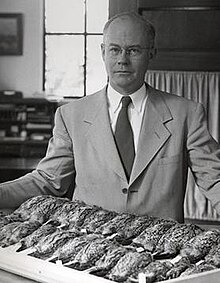Alden H. Miller
Alden H. Miller | |
|---|---|
 Miller with a collection of bird specimens | |
| Born | February 4, 1906 Los Angeles, California |
| Died | October 9, 1965 (aged 59) |
| Nationality | American |
| Alma mater | |
| Awards |
|
| Scientific career | |
| Fields | Ornithology |
| Institutions | |
| Doctoral advisor | Joseph Grinnell |
Alden Holmes Miller (February 4 1906 – October 9, 1965) was an American ornithologist and director of the Museum of Vertebrate Zoology at the University of California, Berkeley for 25 years. He published over 250 papers on the biology, distribution, and taxonomy of birds, and served as president of the American Ornithologists' Union (1953-1955) and the International Commission on Zoological Nomenclature (1964-1965), and as editor of The Condor from 1939 until his death. He was a member of the National Academy of Sciences.
Alden Miller was born February 4, 1906 in Los Angeles, California, the son of Loye H. Miller, a noted professor and researcher.[1][2] He attended the University of California, Los Angeles, earning a B.A. in 1927, then enrolled in UC Berkeley, receiving an M.S. in 1928 and his PhD in 1930 under Joseph Grinnell. Ten years later he succeeded Grinnell as the director of the Museum of Vertebrate Zoology.[3] He is noted for his studies of Lanius (the largest genus of shrikes) and juncos (sparrow-like birds). He received the Brewster Medal for his contributions to ornithology.[1] Miller's approach to collections-based research employed "concepts, theories, practices, tools, and technologies from the laboratory, museum, and field."[4]
Miller supervised around 30 doctoral students and 15 master's students.[a] list. and 15 master's students, many of whom became notable ornithologists in their own right.[6][7] His doctoral students included Charles G. Sibley, who co-developed the Sibley–Ahlquist taxonomy of birds; author and conservationist A. Starker Leopold; and Richard C. Banks, founder of the Ornithological Council.[6]
Miller died of a heart attack at Clear Lake, California, on October 9, 1965, at the age of 59.[1]
Books
- The Distribution of the Birds of California. Berkeley: Cooper Ornithological Club. 1947. (With Joseph Grinnell)
- The Lives of Desert Animals in Joshua Tree National Monument. University of California Press. 1964. (With Robert C. Stebbins)
Notes
References
- ^ a b c Mayr, Ernst (1973). "Alden Holmes Miller (1906–1965)" (PDF). Biographical Memoirs. Washington D.C.: National Academy of Sciences.
- ^ Cooper Ornithological Society
- ^ Davis, John (1967). "In Memoriam: Alden Holmes Miller" (PDF). The Auk. 84 (2): 192–202. doi:10.2307/4083187. JSTOR 4083187.
- ^ Sunderland, Mary E. (2012). "Collections-based research at Berkeley's Museum of Vertebrate Zoology" (PDF). Historical Studies in the Natural Sciences. 42 (2): 82–113. doi:10.1525/hsns.2012.42.2.83. JSTOR 10.1525/hsns.2012.42.2.83.
- ^ Eakin, Richard M.; Leopold, A. Starker; Stirton, Ruben A. (1967). "Alden Holmes Miller, Zoology: Berkeley". University of California: In Memoriam, 1967. Academic Senate, University of California. pp. 68–71.
- ^ a b c Pitelka, Frank A. (1993). "Academic family tree for Loye and Alden Miller". The Condor. 95 (4): 1065–1067. doi:10.2307/1369452. JSTOR 1369452 – via JSTOR.
{{cite journal}}: Unknown parameter|subscription=ignored (|url-access=suggested) (help) - ^ Ehrlich, Paul; Dobkin, David S.; Wheye, Darryl (1988). The Birder's Handbook. Simon and Schuster. p. 267. ISBN 978-0-671-65989-9.
External links
- Alden H. Miller papers collection guide at the Online Archive of California
- 1906 births
- 1965 deaths
- American ornithologists
- American zoologists
- Directors of museums in the United States
- 20th-century zoologists
- People from Los Angeles, California
- University of California, Berkeley alumni
- University of California, Berkeley faculty
- University of California, Los Angeles alumni
- Members of the United States National Academy of Sciences
- American ornithologist stubs
- American zoologist stubs
